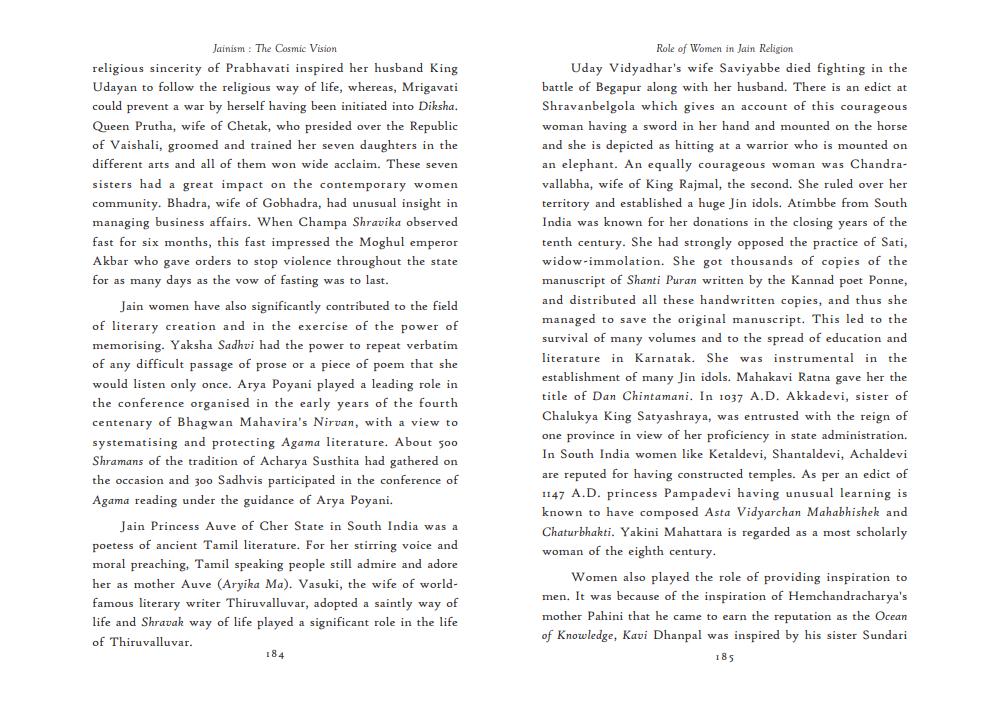________________
Jainism: The Cosmic Vision religious sincerity of Prabhavati inspired her husband King Udayan to follow the religious way of life, whereas, Mrigavati could prevent a war by herself having been initiated into Diksha. Queen Prutha, wife of Chetak, who presided over the Republic of Vaishali, groomed and trained her seven daughters in the different arts and all of them won wide acclaim. These seven sisters had a great impact on the contemporary women community. Bhadra, wife of Gobhadra, had unusual insight in managing business affairs. When Champa Shravika observed fast for six months, this fast impressed the Moghul emperor Akbar who gave orders to stop violence throughout the state for as many days as the vow of fasting was to last.
Jain women have also significantly contributed to the field of literary creation and in the exercise of the power of memorising. Yaksha Sadhvi had the power to repeat verbatim of any difficult passage of prose or a piece of poem that she would listen only once. Arya Poyani played a leading role in the conference organised in the early years of the fourth centenary of Bhagwan Mahavira's Nirvan, with a view to systematising and protecting Agama literature. About 500 Shramans of the tradition of Acharya Susthita had gathered on the occasion and 300 Sadhvis participated in the conference of Agama reading under the guidance of Arya Poyani.
Jain Princess Auve of Cher State in South India was a poetess of ancient Tamil literature. For her stirring voice and moral preaching, Tamil speaking people still admire and adore her as mother Auve (Aryika Ma). Vasuki, the wife of worldfamous literary writer Thiruvalluvar, adopted a saintly way of life and Shravak way of life played a significant role in the life of Thiruvalluvar.
184
Role of Women in Jain Religion Uday Vidyadhar's wife Saviyabbe died fighting in the battle of Begapur along with her husband. There is an edict at Shravanbelgola which gives an account of this courageous woman having a sword in her hand and mounted on the horse and she is depicted as hitting at a warrior who is mounted on an elephant. An equally courageous woman was Chandravallabha, wife of King Rajmal, the second. She ruled over her territory and established a huge Jin idols. Atimbbe from South India was known for her donations in the closing years of the tenth century. She had strongly opposed the practice of Sati, widow-immolation. She got thousands of copies of the manuscript of Shanti Puran written by the Kannad poet Ponne, and distributed all these handwritten copies, and thus she managed to save the original manuscript. This led to the survival of many volumes and to the spread of education and literature in Karnatak. She was instrumental in the establishment of many Jin idols. Mahakavi Ratna gave her the title of Dan Chintamani. In 1037 A.D. Akkadevi, sister of Chalukya King Satyashraya, was entrusted with the reign of one province in view of her proficiency in state administration. In South India women like Ketaldevi, Shantaldevi, Achaldevi are reputed for having constructed temples. As per an edict of 1147 A.D. princess Pampadevi having unusual learning is known to have composed Asta Vidyarchan Mahabhishek and Chaturbhakti. Yakini Mahattara is regarded as a most scholarly woman of the eighth century.
Women also played the role of providing inspiration to men. It was because of the inspiration of Hemchandracharya's mother Pahini that he came to earn the reputation as the Ocean of Knowledge, Kavi Dhanpal was inspired by his sister Sundari
185




